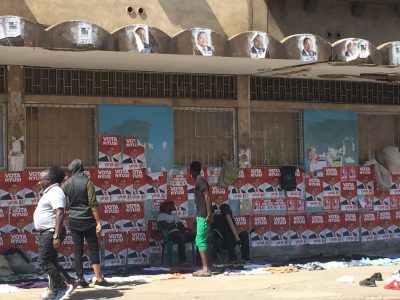Shortly after the September protests in Maputo that were convened by SMS, the Mozambican government issued a Ministerial decree law forcing mobile pre-paid phone users on the country's two networks to register their SIM cards within one month of the decree. This came decision after the government pressured the operators to curtail service to pre-paid customers during the violence.
While the government refers to “criminality” generally, bloggers suggest that the move is being made to stifle further popular protest organized by SMS. Reflectindo sobre Moçambique wrote in a comment on his/her own blog:
A pergunta que temos que fazer é porquê só depois de uma manifestação convocada por sms, o governo corre para bloquear os serviços da telefonia móvel? Porquê não fez isso quando o deputado José Mascarenhas foi ameaçado por sms e posteriormente assassinado?
Mozambique has an estimated 5.5 million mobile subscribers, of a population of 21 million. Authorities initially threatened to cut off those who did not register before the November 15th deadline.
In late November, reportedly only a small percentage of subscribers had gone to register, a process which requires a photocopying of valid identification. This could only be conducted through the two operators, Mcel and Vodacom, and their official outlets and resellers. Some provinces only have a handful of offices serving millions of inhabitants. The operators are now working with the Post Office and Mozambique Telecommunications to reach more of their customers.
Mcel's Head of Commercial Operations Benjamim Fernandes complained on morning radio about the deadline in late November and apparently within four hours, shareholders had convened and called for his resignation. Blogger Chauque commented [Pt] that Fernandes fell for “confronting the Board of Administration and its suck-ups in suits“.
Vodacom voiced its dissatisfaction with the measure, meeting with consumer defense group DECOM. On its site, DECOM quoted a legal opinion from anti-corruption group Center for Public Integrity (CIP) questioning the constitutionality of the Decree
Nas competências, atribuições e funções do Ministério dos Transportes e Comunicações (…) unicamente compete regular as actividades sob sua tutela, mas não impor obrigações ou restrições de direitos aos cidadãos em geral
The deadline in Mozambique for SIM registration has been extended until January 7, 2011.
While the question of “net neutrality” heats up in the US, the question of freedom of access to mobile telephony is of equal significance in many parts of subsaharan Africa. In addition to emerging economies like South Africa and Nigeria, other countries like Tanzania, Botswana, Cameroon all have made SIM card registration mandatory. More countries are considering this in 2011.
In countries like Mozambique recent events have shown that regulators, and subsequently operators, are prone to political pressure. It is still early to assess what impact SIM card registration will have on free speech, or whether it will make mobile usage too expensive or inconvenient for the poor, especially those in rural areas.




4 comments
Bolivia has a similar SIM card registration process, but the govt. says that it is in case one loses his or her phone that one can get the number back. They sent workers to the countryside to get everyone registered, but they still had to extend the deadline.
Brazil too.